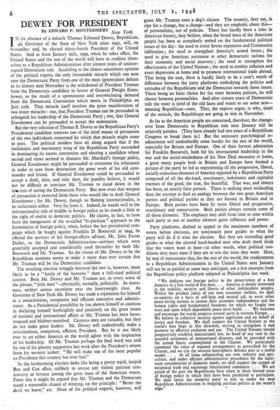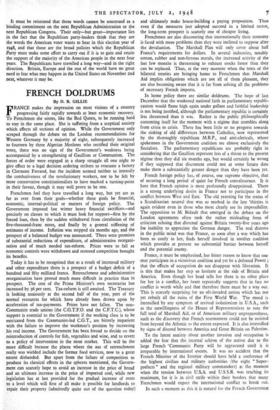DEWEY FOR PRESIDENT
By EDWARD P. MONTGOMERY
But the very selection of Thomas E. Dewey as the Republican Party's Presidential candidate removes one of the chief means of persuasion of the two individuals concerned by which that miracle might come to pass. The political insiders have all along argued that if the isolationist and reactionary wing of the Republican Party succeeded in dominating its recent convention and electing a candidate whose record and views seemed to threaten Mr. Marshall's foreign policy, General Eisenhower might be persuaded to overcome his reluctance in order to save from destruction the great work of his old com- mander and friend. If General Eisenhower could be persuaded to accept a draft, then, and only then, the pundits believe, it would not be difficult to convince Mr. Truman to stand down in the iraw-ests of saving the Democratic Party. But now even that weapon of persuasion is removed from those who would like to draft General Eisenhower ; for Mr. Dewey, though no flaming internationalist, is no isolationist either. Very far from it. Indeed, he stands well to the internationalist side of middle in foreign policy as he stands a little to the right of centre in domestic politics. He claims, in fact, to have been the inauguratot of the so-called "bi-partisan " approach to the formulation of foreign policy, when, before the last presidential cam- paign which he fought against Franklin D. Roosevelt in 1944, he offered the services of his foreign-affairs adviser, Mr. John Foster Dulles, to the Democratic Administration—services which were gratefully accepted and considerably used thereafter by both Mr. Roosevelt and Mr. Truman. So the choice of Mr. Dewey to be the Republican nominee seems to make it more than ever certain that Mr. Truman will be the Democratic candidate.
The resulting election struggle between the two is, however, more likely to be a " battle of the bantams " than a full-sized political contest. Both Mr. Dewey and Mr. Truman are, in every sense of the phrase, " little men "—physically, mentally, politically. As states- men, neither comes anywhere near the heavyweight class. As Governor of New York Mr. Dewey has made a reputation for himself as a conscientious, competent and efficient executive and adminis- trator. As a Presidential possibility he has shown himself as cautious in declaring himself forthrightly and positively on the great issues of national and international affairs as Mr. Truman has been loose- tongued and blabber-mouthed. Cautious men are valuable, but they do not make great leaders. Mr. Dewey will undoubtedly make a conscientious, competent, efficient President. But he is not likely ever to set either America or the world aglow with the inspiration of his leadership. Of Mr. Truman perhaps the final word was said by one of his gloomy supporters last week after the President's return from his western junket : " He will make one of the most popular ex-Presidents this country has ever had."
So the forthcoming election looks like being a pretty tepid, insipid Box and Cox affair, unlikely to arouse any violent partisan con- troversy or fervour among the great mass of the American voters. From this it might be argued that Mr. Truman and the Democrats stand a reasonable chance of winning, on the principle : " Better the devil we know," etc. None of the political experts, however, will
grant Mr. Truman even a dog's chance. The country, they say, is ripe for a change, but a change—and they are emphatic about this— of personalities, not of policies. There has hardly been a time in American history, they believe, when the broad mass of the American
people has been so completely united on the fundamental political issues of the day : the need to resist Soviet expansion and Communist infiltration ; the need to strengthen America's armed forces ; the need to give American assistance to other democratic nations for their economic and social recovery ; the need to strengthen the effectiveness of the United Nations ; the need to combat inflation and avert depression at home and to promote international trade abroad. That being the case, there is hardly likely to be a cent's worth of difference between the party platforms embodying the policies and attitudes of the Republicans and the Democrats towards those issues. There being no basic choice for the voter between policies, he will choose between personalities. And after sixteen years of Democratic rule the voter is tired of the old faces and wants to see some new— meaning Republican—ones. That, the experts argue, is why, short of the miracle, the Republicans are going to win in November.
As far as the American people are concerned, therefore, the change- over from Democratic to Republican rule next January will be relatively painless. (They have already had two years of a Republican
Congress to break them in.) But the necessary psychologic-al re- adjustment will undoubtedly come harder for the rest of the world, especially for Britain and Europe. Out of their fervent admiration for Franklin Roosevelt, both for his international leadership in the war and the social-mindedness of his New Deal measures at home, a great many people both in Britain and Europe have formed a
picture of the party he led as representing all the progressive, liberal, socially-conscious elements of America opposed by a Republican Party composed of all the die-hard, reactionary, isolationist and capitalist enemies of the good, the true, the beautiful. That was, and always has been, an utterly false picture. There is nothing more misleading than the attempt to find an analogy between the two great American parties and political parties as they are known in Britain and in Europe. Both parties have been by turns liberal and progressive, reactionary and conservative. Both parties always contain some of all those elements. The emphasis may shift from time to time within each party as one or another element gains influence and power.
Party platforms, drafted to appeal to the maximum numbers of voters before elections, are notoriously poor guides to what the party will do if it wins the election. But they are exceeding good guides to what the shrewd hard-headed men who draft therti think that the voters want to hear—in other words, what political con- ditions they must meet if they are to win the votes they want. Here, by way of reassurance that, for the rest of the world, the readjustment to a Republican Administration in the United States next January will not be as painful as some may anticipate, are a few excerpts from the Republican policy platform adopted at Philadelphia last week.
" We dedicate our foreign policy to the preservation of a free America in a free world of free men.... America is deeply interested in the stability, security and liberty of other independent peoples. Within the prudent limits of our own economic welfare, we shall co-operate, on a basis of self-help and mutual aid, to assist other peace-loving nations to restore their economic independence and the human rights and fundamental freedoms for which we fought two wars and upon which dependable peace must build.... We welcome and encourage the sturdy progress toward unity in western Europe.... We believe in collective security against aggression and on behalf of justice and freedom. We shR11 support the United Nations as the world's best hope in this direction, striving to strengthen it and promote its effective evolution and use. The United Nations should progressively establish international law, be freed of any veto in the peaceful settlement of international disputes, and be provided with the armed forces contemplated in the Charter. We particularly commend the value of regional arrangements as prescribed by the Charter, and we cite the western hemispheric defence pact as a useful model. . . . At all times safeguarding our own industry and agri- culture, and under efficient administrative procedures for the legiti- mate consideration of domestic needs, we shall support the system of reciprocal trade and encourage international commerce. . . . We are proud of the part the Republicans have taken in those limited areas of foreign policy in which they have been permitted to participate. We shall invite the minority party to join us under the next Republican Administration in stopping partisan politics at the water's edge,"
It must be reiterated that those words cannot be construed as a binding commitment on the next Republican Administration or the next Republican Congress. Their only—but great—importance lies in- the fact that the Republican party-leaders think that they are the words the American voter wants to hear in this election year of 1948, and that those are the broad policies which the Republican Party must make some effort to carry out if it is to gain and retain the support of the majority of the American people in the next four years. The Republicans have travelled a long way—and in the right direction. Britain, Europe and the rest of the world have no great need to fear what may happen in the United States on November 2nd next, whatever it may be.







































 Previous page
Previous page